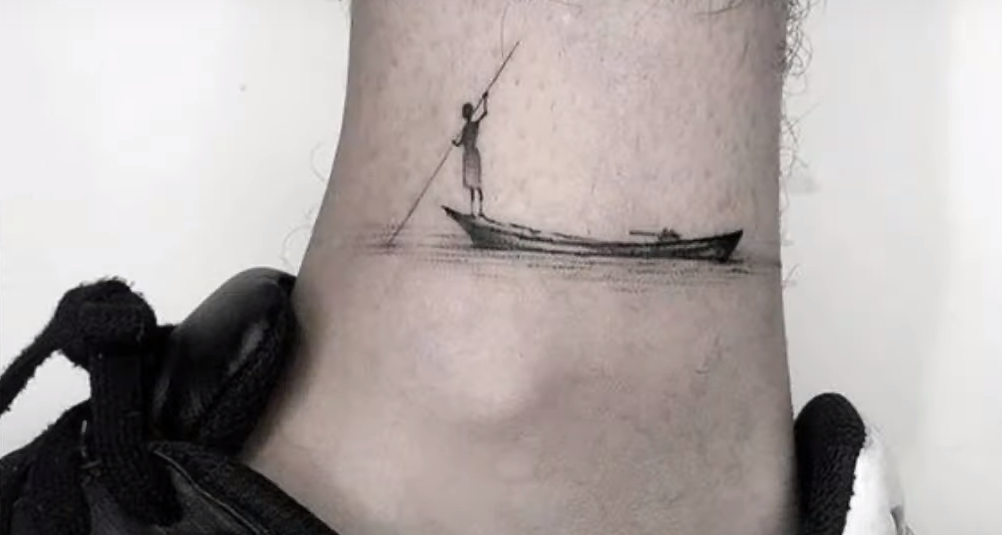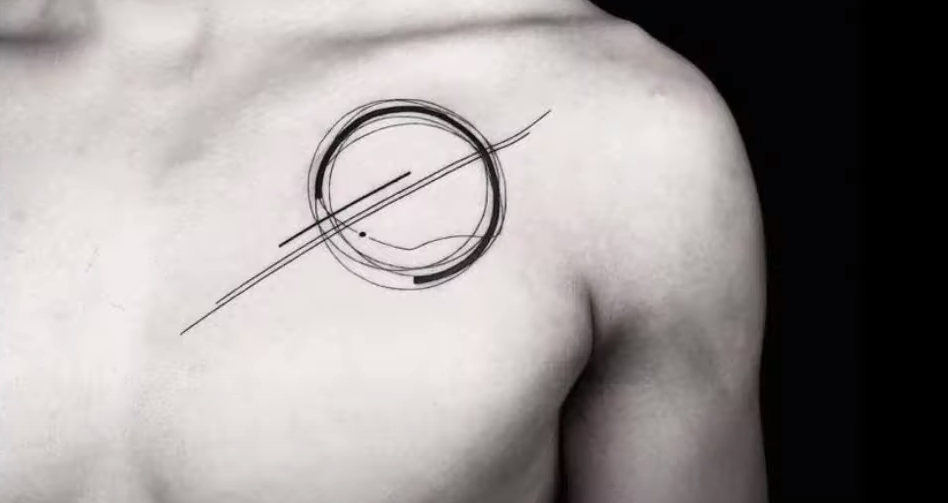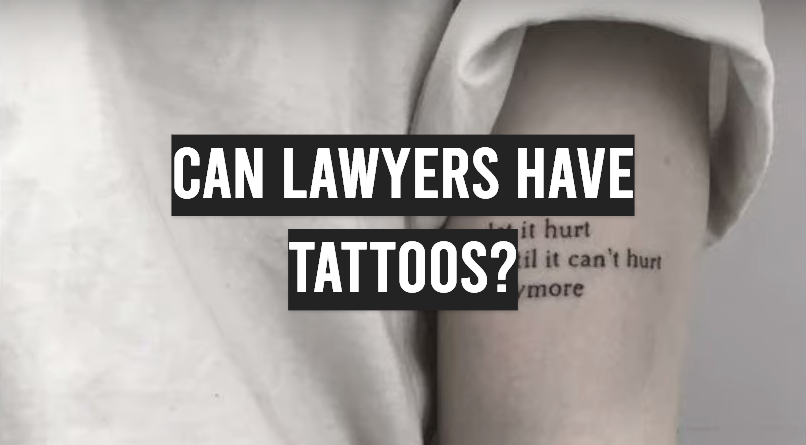In an increasingly progressive society that stresses personal expression and creativity, it’s natural to wonder if there are any restrictions when it comes to what lawyers can or cannot do. In particular, people might be wondering if they must keep their tattoos hidden while on the job as a lawyer. People worry especially about inking up a hand or arm with designs that could catch someone’s attention–but is this really necessary? Is it even allowed for attorneys to have visible tattoos in certain states, cities, or countries? This post explores the debate over whether lawyers should get body art and the implications behind those decisions. Read on for more information!
Lawyer Tattoo Expectations
When it comes to tattoos, the expectations for lawyers are a bit different than they are for other professionals. While employers’ rules on body art vary, most law firms maintain professional dress codes that require their attorneys to cover any visible tattoos while in the workplace. This means that if you want to have a tattoo and work as a lawyer, you need to make sure it can be easily covered up with clothing or makeup. Some firms may also require permanent removal of certain types of tattoos before they will hire you.
For example, tattoos that are deemed offensive or inappropriate by potential employers may cause them not to hire you – even if they can’t see the tattoo on a regular basis. It’s also important to consider whether or not the tattoo could potentially harm your career down the line if it were to become visible in professional settings.
Given these considerations, many lawyers opt for more conservative designs that won’t draw attention away from their work and credentials. In some cases, this means avoiding tattoos on areas of the body like hands, neck, and face that are difficult to cover up. [1]
Professionalism and Client Confidence
When it comes to showing professionalism and instilling confidence in their clients, lawyers need to take into account the fact that many people may not be comfortable with visible tattoos. This is especially important for public defenders, as they are more likely to interact with jurors. Even if a lawyer has an impeccable legal record, visible tattoos could affect how potential clients perceive them. Additionally, certain kinds of tattoos (i.e., those featuring profanity or offensive images) might create a negative impression on clients and colleagues alike.
Thus, while having a tattoo does not necessarily make someone unprofessional, it can be seen as such in some cases.
Ultimately, when deciding whether or not to get a visible tattoo as a lawyer, one should carefully consider the potential effects it could have on their professional reputation. It may be that in some cases, having a tattoo is not worth the risk of losing client trust and respect. On the other hand, if done tastefully and with consideration for how it might be perceived by clients, getting a visible tattoo can be an expression of individualism that does not hinder one’s professionalism.
Street Credibility and Reputation in the Legal World
The legal world is well known and highly respected for its professionalism, and many attorneys find that having tattoos can put a dent in their street credibility. Many clients may take offense to visible tattoos, as they may think the attorney is not taking their case seriously or does not have the expertise to handle it. It’s important for attorneys to consider how visible their tattoos are and how they could be perceived by potential clients when making the decision to get inked.
The legal profession also places a lot of emphasis on appearances. An attorney’s reputation is important, as it can make or break their career. In many cases, having tattoos may reflect poorly on an attorney and create a negative perception in the eyes of potential clients or employers. Even though there are no official regulations against lawyers with tattoos, they should still consider how those tattoos might be interpreted by colleagues and clients before making any permanent decisions.

Personal Expression in Private Practice or Corporate Settings
When considering whether lawyers can have tattoos, it should be noted that the legal profession is a very conservative one. This means that any kind of personal expression, including tattoos, must be done with care and discretion. In private practice settings, attorneys may choose to express their individual style in whatever way they see fit, as long as it does not negatively affect their professional image or disrupt court proceedings. However, in corporate settings this will likely depend on the company’s dress code policy and culture. Generally speaking, most employers expect their employees to maintain an air of professionalism in order to ensure the success of the organization; thus visible tattoos are not usually allowed. [2]
If a lawyer chooses to get a tattoo despite potential negative consequences for career advancement, it is important to be aware of the implications. For example, tattoos can often have religious or political meanings and could lead to uncomfortable conversations with clients or employers. Furthermore, certain types of tattoos may give off an impression of rebelliousness which can damage one’s professional image. Therefore, for those who want to express themselves through body art while remaining in good standing within their profession, discretion is key.
Potential Consequences of Visible Lawyer Tattoos
Impact on Clients’ Perception of Lawyers
Many clients may form an opinion about a lawyer based on the lawyer’s appearance. A visible tattoo on a lawyer could cause some clients to question the credibility and professionalism of that lawyer. Clients may also be concerned that a lawyer with tattoos is not taking their case seriously enough, or is too “hip” to be trusted with important legal matters.
Dressing for Court or Negotiating Settlements with Opposing Counsel
If a lawyer is representing a client in court or negotiating with opposing counsel, having a visible tattoo may be seen as unprofessional. The judge or attorney on the other side of the table may not take the lawyer seriously if they see an inappropriate or distracting tattoo. This could potentially put the lawyer’s client at a disadvantage and hamper their chances of success in legal proceedings.

Potential Employment Restrictions
In some law firms, there may be restrictions on lawyers’ appearance that forbid tattoos from being visible when meeting with clients or appearing in court. Additionally, some bar associations have rules that require members to present themselves in a “dignified and professional manner” and limit certain forms of self-expression like tattoos. Violation of these rules could result in disciplinary actions against the lawyer. It’s important for lawyers to consider the potential consequences of having visible tattoos before making a decision about whether or not to get one.
While it may be personally fulfilling to express themselves through body art, lawyers should always keep their professional reputation and obligations in mind when considering whether or not to get a tattoo. [3]
Legal Considerations for Lawyers With Visible Tattoos: State Laws & Policies
When deciding whether a lawyer can have visible tattoos, it is important to consider the jurisdiction in which they are practicing. Every state has its own set of rules and regulations regarding professional appearance and conduct for attorneys. Some states, such as North Carolina, explicitly prohibit lawyers from having visible tattoos or require them to be covered up while on duty. Other states may not explicitly ban tattoos but could still require that any body art must remain concealed by clothing or other methods.
Finally, attorneys should be aware that visible tattoos may influence how they are perceived by clients and judges. While some members of the legal profession may be accepting of body art, others may not feel the same way. It is important for lawyers to consider these potential reactions when deciding whether or not to display any tattoos.

Tattoo Removal Options for Lawyers
Laser Tattoo Removal
Laser tattoo removal is a popular option for lawyers who want to get rid of their tattoos. During laser treatment, the technician uses an intense beam of light to break up the pigments in the tattoo. The laser works by targeting specific colors and breaking them into tiny particles that are naturally absorbed into the body. Laser treatments can be used to remove all or part of a tattoo and usually require multiple sessions for complete removal.
Intense Pulsed Light Therapy (IPL)
IPL therapy is another popular option for tattoo removal. It uses short bursts of light to break up the ink particles in a tattoo and gradually fade its appearance. IPL treatments typically require fewer sessions than laser treatments, but the degree of fading may not be as complete.
Salabrasion & Dermabrasion
Salabrasion and dermabrasion are two other methods used for tattoo removal, though they are not as common as laser or IPL treatments. Salabrasion is a process where saltwater is applied to the skin and then abraded with a special brush. Dermabrasion uses an abrasive device to mechanically remove the outer layer of skin. Both techniques can be effective in removing tattoos, but may cause scarring or discoloration if done improperly. [4]
Excision and Scar Revision Surgery
Excision and scar revision surgery are extreme measures that can be used for tattoo removal. During the excision procedure, a surgeon will cut out the tattooed area of skin and then use sutures to close the wound. Scar revision surgery is typically used after an excision to reduce the appearance of any remaining scars from the procedure.

Tattoo Removal Creams
Tattoo removal creams are another option for lawyers looking to remove their tattoos. These creams contain ingredients that break down the ink particles in tattoos, allowing them to be gradually faded away over time. However, these creams may not be effective in completely removing a tattoo and may cause skin irritation or discoloration when used improperly.
No matter which tattoo removal option you choose, it’s important to consult with a qualified professional before beginning any treatment. A professional can advise you on the best course of action and ensure that your tattoo is removed safely and effectively. Furthermore, they can help you consider any legal implications of having a tattoo removed when it comes to practicing law. With the right advice and proper care, removing a tattoo doesn’t have to be a challenge for lawyers.
The Pros & Cons of Lawyer Tattoos: What the Experts Say
Though the legality of workplace tattoos is still somewhat up for debate, many legal experts agree that lawyers should think twice before getting inked. According to a study by the University of Arizona Law School, tattoos may be seen as “unprofessional” and could potentially hurt an attorney’s reputation in court or with potential employers.
Ultimately, it’s important for lawyers to consider both sides when deciding if they should get a tattoo. It’s not necessarily wrong to have one, but it could ultimately hurt their chances of success in the legal profession if other attorneys see it as unprofessional or inappropriate. Lawyers should think carefully about the placement and content of any tattoos they may be considering before making a decision.

No matter what side of the debate you fall on, it is important to remember that tattoos are permanent choices. Whatever your opinion on lawyer tattoos, make sure you understand all the potential outcomes and ramifications before making such a lasting choice. And above all else, strive for professional excellence! That way no one can argue with your decisions in or out of court. [5]
FAQs
Can a professional have tattoos?
The short answer is yes! In the United States, there are no laws prohibiting lawyers from having tattoos. However, many clients and employers may have a different opinion about visible tattoos in the work environment. Some firms may require employees to cover their tattoos or even refuse to hire candidates with visible body art. It is important for lawyers to research each firm’s policies before applying for jobs or representing that firm as counsel. It’s also important to note that certain types of body art may be frowned upon by some clients and employers, such as those containing offensive language or graphics. Lawyers should consider how their body art might present themselves professionally when deciding which type of tattoo they want and where it should be placed.
Can lawyers have tattoos in Canada?
The answer is yes, they can. In fact, there are no legal restrictions on lawyers having tattoos in Canada. However, the Canadian Bar Association does encourage its members to dress professionally and maintain a professional appearance when representing clients in court or in other public settings. Therefore, it is important for lawyers to be mindful of how their tattoos may be perceived by others. While some employers and organizations might not have an issue with visible tattoos, it can still be beneficial to cover them up during more formal meetings or occasions. For those considering getting a tattoo that could potentially affect their career as a lawyer, it’s important to take into consideration the potential implications and think carefully about whether or not the tattoo will reflect positively on you within your chosen profession.
Can lawyers have tattoos in the Philippines?
The answer to this question is yes, as long as their tattoos are not visible while wearing the prescribed court attire. The Supreme Court of the Philippines has issued a resolution that states: “Lawyers may sport body art or tattoos provided they are not visible while in court and are not contrary to good moral values”. It follows then that Filipino lawyers can have tattoos, so long as they do not show them publicly when representing clients in court or attending legal-related functions. Of course, lawyers must also be mindful of the professional image they create for themselves. Having a tattoo could be perceived by some people–including judges–as unbecoming of a lawyer’s character and reputation, so it isn’t advisable to go overboard with body art.
Are lawyers allowed to have tattoos in South Africa?
The answer to this question depends on both the type of lawyer and their workplace. Generally speaking, tattoos are permitted for lawyers in South Africa. However, there is no one definitive answer as each employer has different policies regarding tattooed lawyers. For example, some law firms may have dress codes which prohibit visible body art or alternatively allow it as long as it is not highly visible and is covered while at work. Other employers may be more lenient with the types of tattoos that can be shown in the workplace.
Which jobs do not allow tattoos?
Certain legal jobs may still have rules prohibiting visible tattoos, such as roles which involve appearing in court or other formal settings. Such positions often require a professional appearance which could be compromised by tattoos and piercings. It is therefore important to check the specific dress code of your employer before having any work done. Overall, it is safe to say that lawyers can generally have tattoos but must consider their workplace’s policies and remember that certain professional roles might not allow them.
Will tattoos affect my career?
The short answer is that it depends. While tattoos are becoming increasingly more accepted in the workplace, there may still be a stigma attached to them in some professions such as law. Ultimately, it’s up to you to decide whether or not you want to get a tattoo and if you think it will have an impact on your career prospects. Before getting a tattoo, it’s important to consider how visible it will be and who might see it. Generally speaking, having visible tattoos can be seen as unprofessional in certain industries like law and finance. If you are considering working in these fields then try to keep any ink hidden beneath long-sleeved garments. On the other hand, if your job won’t require you to be in a conservative environment, then having visible tattoos shouldn’t be an issue. At the end of the day, it’s your decision and nobody else’s.
Is tattoo a problem for visa?
Although a lawyer’s tattoos may not be an issue within the workplace, they can become a problem when it comes to visas or other international travel. Many countries have strict laws against people with visible tattoos entering their borders, and this could cause an issue for lawyers who need to work in those countries. Additionally, some countries require that visitors cover up any visible tattoos while on their soil; although this is not always strictly enforced, it could create difficulties if the lawyer is required to appear in court in such a country. As such, lawyers should consider whether or not they are willing to cover up their tattoos before traveling abroad. Ultimately, it’s important for lawyers to look into the individual laws of a country before visiting if they have visible tattoos.
Useful Video: CAN LAWYERS AND LAW STUDENTS HAVE TATTOOS? (Do looks matter in the legal world?)
Conclusion
Ultimately, lawyers who are considering getting a tattoo should be cognizant of the potential consequences that it could have on their professional reputation and practice. While some firms may not mind attorneys having tattoos, other employers may find them to be unprofessional or distracting. Therefore, when deciding whether to get a tattoo, attorneys should take into account their own moral code as well as what is appropriate in their particular field and workplace environment. Ultimately, each person must make an individual decision about how comfortable they are with having visible tattoos while practicing law. It’s ultimately up to the lawyer to decide if they want to get a tattoo and what kind of statement they want it to make. With all these factors taken into consideration, lawyers can confidently decide if getting a tattoo is the right choice for them.
References:
- https://elawtalk.com/can-lawyers-have-tattoos/
- https://www.tattoorules.com/other-professions/lawyers-attorneys-tattoos/
- https://canliiconnects.org/en/commentaries/88769
- https://www.forbes.com/sites/forbesbusinesscouncil/2022/07/22/do-tattoos-have-a-place-in-the-modern-legal-profession/
- https://nationaljurist.com/smartlawyer/should-lawyers-get-inked/
- https://amazelaw.com/can-lawyers-have-tattoos/












Leave a Review